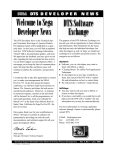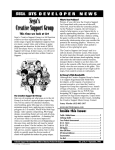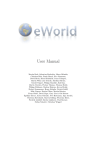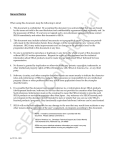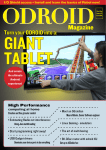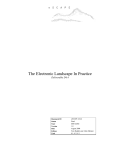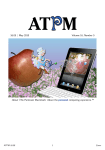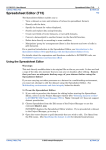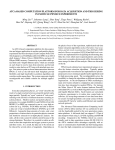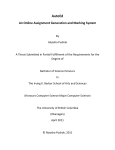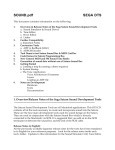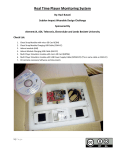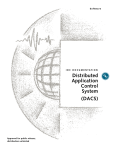Download SEGA
Transcript
TM Here is the latest information regarding new hardware and peripheral products from SEGA of America. Welcome to this issue of DTS Developer News, the Technical Support Newsletter from SEGA of America Product Development designed exclusively for SEGA and Third Party Developers. We have recently reorganized our resources in an effort to provide better support, quicker response, and a stronger offering of tools and documentation. As a result, we have established a Central Dispatcher position to provide a frontline contact for you. Judy Jetté is your point of contact, and this newsletter provides you with information on the ways to contact DTS. The preferred method for inquiries is through E-Mail. To facilitate and encourage you to E-Mail your requests and inquiries, we have attached a special offer from America Online, providing 10 free hours of connect time. America Online is one of the most cost-effective online services, and provides an electronic mail and international E-Mail gateway for communication through the Internet. Of course, there are other commercial on-line services available, such as CompuServe, eWorld, GEnie, and Prodigy, as well as direct Internet connections. If you do not currently have an account with an on-line service, we strongly recommend that you subscribe to the service of your choice, and establish an E-Mail address. We have a number of new support tools to assist you in your development efforts. First, we are pleased to announce the availability of Saturn Training Materials on videotape. These tapes include information presented at the Saturn Developer’s Conference held in May, and have been updated to reflect new developments. We also have a number of new and updated tools. You will find an updated list in this newsletter. For those of you that need Saturn or Mars documentation, we have provided a complete listing in the back of this newsletter. Be sure to FAX or E-Mail use your requests, and please include your E-Mail address so we can update our records. Genesis Universal Driver Software The latest version is available on the DTS BBS. It includes driver code for 3-button/6-button, Activator, Mega Mouse, Menacer, and Team Player controllers. Note: It is imperative to use the universal driver in your Genesis games or one that emulates its exact timing and signal polarities. Genesis 32X The Genesis 32X will start shipping in mid-November. Currently version 2.0 target development systems are available for developers on a priority basis. Rev. B CartDev development systems with Cross Products debuggers are also available for use with the version 2.0 targets. The first of the final version CartDevs for use with production 32X units should be available in November. Genesis Mega Mouse This 4-button (3 buttons plus START) mouse is available now. Genesis Activator The two-level body input controller is available now. Genesis Team Player The upgraded version of this 4-player adapter is available now. It works with virtually all 1 to 8 player games available for SEGA Genesis. All prototypes, finished product, software drivers, development tools, and documentation should be requested through the SEGA of America Developer Technical Support department. Thank you for the outstanding products you have contributed to the SEGA platforms. We look forward to providing you with the tools, documentation and support you may need. Manager, Developer Technical Support Technical Support Newsletter from SEGA of America Product Development © 1994 Sega All rights reserved Vol. 2, No. 2 • Oct. 1994 I’m Judy Jetté. In my current role as Developer Technical Support Central Dispatcher, I am the front-line contact for developer inquires and support. The preferred way to contact DTS is through E-Mail. This will save paper and time, and provides a tracking record of correspondence. If E-Mail is not available, FAX your requests. E-Mail: FAX: DTS Phone: [email protected] (415) 802-1717 (415) 802-1719 All tools are accessible from the DTS BBS. E-Mail or FAX DTS for information on how to access the DTS BBS. 32X: 1) MARSDMA.ZIP 2) DIAG_EXE.ZIP DIAG_SRC.ZIP 3) C00915.ZIP 4) 32X_1012.ZIP 1) 32X_1014.ZIP Note: If you do not have an E- Mail account, we are attaching a special offer from America Online for 10 free hours. Examples of doing DMA on 32X 32X Hardware diagnostics program CartDev software with a simple 32X example program written in Snasm 32X Snasm example with PWM driver 32X GNU/SIERRA C example (beta release) Saturn: We currently have several English and Japanese versions of the following tools. The Japanese is for Model S (English in translation now, available end of Oct.) and the English is for Model M. Graphics Tools/Sound Tools package for the Mac: CD-ROM Tools Software Library What is the difference between a SEGA Developer and a Third Party Publisher? SEGA Developer A SEGA Producer will hire qualified parties as needed to develop a game on a contract basis (programmers, artists, etc.). SEGA will market and distribute the game. To become a SEGA Developer, contact DTS for details. Two Saturn demos are available for Model S Targets: VSHELL3. ZIP (for Programming Box 2.0) VSHELL4. ZIP (for Programming Box 3.0 and beyond) Saturn and Mars: GNU Version H-1: A full compiler tool set Third Party Publisher The Third Party is licensed to use the SEGA name. In order to become a SEGA Third Party Publisher/ Licensee, a company must have the ability to market, sell, support, and create high quality products on SEGA platforms. Third Party Developers are parties sponsered by Third Party Publishers to build products on SEGA platforms. For more information on becoming a Third Party Developer, please direct your correspondence to: Third Party Licensing SEGA of America 255 Shoreline Suite 400 Redwood City, Ca 94065 Developer Tech Support is pleased to announce the availability of Saturn Training Materials on Videotape. The materials are based on the Saturn Developer’s Conference held in May, with updated content. The set of six tapes are accompanied by a notebook of the slides that make up the presentations. The topics include: • • • • Saturn System Overview SH2 VDP1 VDP2 • • • • Graphics Tools Developer’s Tools CartDev Sound The tapes are available at a cost of $75.00. Contact your Producer or Account Executive for ordering information. How do I get the DSP started on the Saturn? Use the Linker to configure the DSP that is desired making sure that you have reserved enough ring buffer space. Make sure all the mixer and the send and return levels in the tone editor are set correctly. Link the DSP with your patches by selecting the menu item “Link”, then download. When I install my E7000pc POD into my Saturn Small Box, why does IPI give me “Invalid Pod Message?” When you install a pod into a Saturn Small Box, there is a 171 pin PGA socket that needs to be inserted into the Saturn board. Make sure the socket clicks into place. However, when using an EVA board, do not use this extra socket. Technical Support Engineer Bert Mauricio received his B.S. in Computer Science from San Francisco State University, and has been with SEGA for four years. Prior to working at SEGA, Bert was responsible for testing and QA at The Learning Company. At SEGA, he spent three years supporting SEGA hardware development systems for GameGear, Genesis, and SEGA CD. He is currently concentrating on 32X and Saturn, but continues to support all platforms, including Cross Products, S.N.Systems, Zaxtek, Hitachi, and SEGA development systems. If you are unsure of how to hook up a development system, or have other hardware related questions, don’t hesitate to contact Developer Technical Support. I just got my CartDev and when I run it, I get a “address out of range ” error when using the 32X CartDev Development System. Make sure the SRAM card is plugged in securely. Make sure all four DIP switches on the SRAM card are set to the “on” position. The lexical scanner for the GNU assembler will see ANY string starting with vbr (ex. vbr_table) as a reference to the vbr register. Do not use vbr or other reserved register names with the GNU assembler. Instead of using vbr_table, try vector_base_register_table. GNU won’t compile... Re-boot the machine without loading the configuration file. In order to make Audio tools run smoother on the Mac for Saturn, you must put an inline terminator on the SCSI cable connected to the Saturn. QSound on the SEGA CD QSound for the SEGA CD can be done with 3 different methods: • Non-interactive red-book audio • Non-interactive PCM audio • Interactive PCM audio Non-interactive Red-Book Audio Jet planes roar toward you. The drone of missiles approaches at nine o’clock. You turn and fire before you even have them in your sights. The sound responds as the graphics do, instantly. You’re reacting with all your senses on full alert—faster than you could to sight alone. You’re playing a game with QSound. QSound Virtual Audio QSound is a patented, innovative process for creating surround-type sound effects using only standard stereo speakers. It requires only traditional stereo playback equipment for reproduction, and allows a game designer to place sound effects at specific locations outside the range of the speakers. Your game is no longer limited to the screen in front of the user. Now, it surrounds them with audio clues that give real spaital dimension and interactive responsiveness to elements and events- on and off the screen. Using the QSound process, sound sources can be placed in “virtual space,” an arc approximately x90 degrees in front of the listener, well outside the speakers and beyond the confines of the video screen. QSound processing may be accomplished in a number of ways, but becomes, in each case, an integral part of the stereo audio stream, and needs no decoding hardware. The listener needs only a normal stereo delivery system to experience the effect. The red-book audio tracks (“CD music”) of a CD title can be processed at mix down time using the QSystem II. This professional audio device works in real-time, allowing the audio engineer to move up to 8 specific sounds around in QSpace, using its 8 monaural inputs and stereo output. The QSystem II has full MIDI and SMPTE synchronization capabilities, allowing it to be controlled from any commercial sequencer or SMPTE system. Once the audio is mixed down to a stereo format, it gets transferred to the CD. Since the QSound processing happens at the time of mixing, the QSound elements are non-interactive; i.e. they are fixed and the position of the sounds are not changeable by the CPU. One excellent example of using QSound on red-book audio tracks is SEGA’s Ecco the Dolphin. The background musical ambiance is redbook audio processed with the QSystem II. QSound has also created a QSound module as a plugin for Sound Designer II. This module, Pro Qbit, can process an already mixed stereo sound file and apply the QSound algorithms to it. While not as flexible as the QSystem II, Pro Qbit has the effect of greatly widening the stereo sound field. For example, if the original stereo mix had a sound panned to the full right (that is, in the right speaker only), after Pro Qbit processing, that sound would appear to be coming from well off to the player’s right. It should be noted that ProQbit , while significantly widening the stereo sound field, typically does not give as wide an image to sounds as does the QSystem II. As with the QSystem II, red-book audio produced with Pro Qbit is non-interactive. Non-Interactive PCM Audio As its name implies, this method uses the PCM chip on the SEGA CD system to produce sounds, allowing them to be instantly triggered by the game processor. The scheme works as follows: First, a stereo QSound sound effect is created from a monaural source, for example a jet plane flying from 90 degrees to the left to 90 degrees to the right. This stereo sound can be created with the QSystem II, Pro Qbit, or by QCreator, a Windows program designed especially for the purpose of creating stereo QSound sound effects from monaural sound files. (See the QSound Application Guide for more information on QCreator). This stereo sound is loaded into the PCM RAM. The PCM uses 2 oscillators to play the sound. One oscillator is panned full left (volume 7f,0) and plays the left channel of the stereo sound effect; the other is panned full right (volume 0,7f) and plays the right channel of the stereo sound effect. Then, both channels are turned on at exactly the same instant. This is very important. Both oscillators must start producing the sounds at the same moment. (Note: This is supported as well as dynamic loading of QSound sounds in the Hammond SEGA CD Audio Driver available from SEGA). The result is a plane flying from left to right, in full QSound. Since the sound is loaded into PCM RAM, this sound effect can be played instantly by the CPU. However, the CPU can only trigger the “fly left to right” sound; it cannot change the QSound panning of the sound from moment to moment. In that sense, it is non-interactive. (However, the sound could be made to go from right to left by reversing the panning of the 2 oscillators) Interactive PCM Audio (Real-Time Panning Interactive QSound) This method allows fully interactive control of a QSound sound effect by the CPU on a moment to moment basis. It works basically the same way as the non-interactive PCM audio with two important differences: 1) QCreator is used to create a special “image file” from the monaural sound effect. 2) The CPU controls the QSound position of the sound from moment to moment by adjusting the left and right volumes of the 2 oscillators used to play the original sound and the image file sound in specific ways. This can work for looping sounds as well as non-looping sounds. (Note: This is also fully supported in the Hammond SEGA CD Audio Driver). QSound on the Saturn and 32X Since both the 32X and Saturn use digitized data as the basis for sound generation (PWM for 32X and PCM for Saturn), the methods described above (non-interactive PCM and interactive PCM) for the SEGA CD can be implemented on the 32-bit systems. However, because of the increased processing power available in the new systems, QSound has started to port versions of its algorithms directly to the processors on these systems. One advantage this has is that only a monaural version of sounds need be stored (especially important in a cartridge based product) and that QSound can be used on any sound with full interactive control. The following are brief descriptions of how QSound plans to implement the QSound algorithms for the 32X and Saturn: 32X The 32X contains a stereo PWM DAC for sound generation. The slave SH2 can send data to the DAC, based on a special PWM interrupt. QSound is porting its algorithm to the slave SH2. The goal is to process up to 4 channels of PWM data, allowing real-time interactive QSound panning of each sound individually using less than 15% of the slave SH2. Saturn The sound chip in the Saturn is the sophisticated SCSP chip, providing up to 32 channels of PCM and FM sound with a built-in DSP processor stage. QSound is now developing a DSP software module that will run real-time interactive QSound entirely on the SCSP’s built-in DSP processor. This will allow some of the 32 voices to be processed by the QSound algorithms. Since the algorithms will run entirely on the SCSP, there will be no performance “hit” on any of the other processors. Additional Information: For further information on the features, capabilities, and updates of QSound, please contact: QSound Labs, Inc. 2748 37th Ave. NE. Calgary, Alberta, Canada T1Y5L3 (403) 291-2492 fax: (403) 250-1521 E-Mail: [email protected] If you would like to obtain the QSound technology, contact your SEGA Producer or Account Executive. 2. Hesitation Problem—from the beginning, certain movies caused the Cinepak driver to display an extremely noticeable audio and video hesitation during playback. This problem was inherent to most movies that did not utilize a 600 video time scale. This problem has been fixed. Cinepak is a utility which facilitates adding video and animation to the SEGA CD. Cinepak makes it much easier to add full-screen, full-motion, QuickTime movies to SEGA CD. With Cinepak, you can dramatically reduce your production time and improve the quality of video in your games. Specially tuned to enhance SEGA CD playback, Cinepak technology uses high compression ratios and sophisticated color reduction techniques to fully integrate QuickTime movies with your programs. Cinepak for SEGA works with the QuickTime digital video format developed by Apple Computer for use on Macintosh computers. Cinepak processes QuickTime files, so before you can use Cinepak, you need to have your video and audio data transferred into the QuickTime format. This can be done using tools available, such as Adobe Premiere. As an alternative, professional video production and file preparation services with QuickTime and multimedia experience can use utilized. To see examples of Cinepak technology in action, check out any of the following SEGA CD titles: Jurassic Park by SEGA, Dracula Unleashed by SEGA, Bill Walsh College Football by Electronic Arts, Cliffhanger by Sony Imagesoft, and Joe Montana Football by SEGA. If you would like to obtain the Cinepak technology, contact your Producer or Account Executive. If you would like to find out more about the features, capabilities, and updates of Cinepak, please contact SEGA Developer Technical Support. 3. Disk Seek Problem—this bug prevented the Cinepak driver code from recognizing a sector overshoot. This caused the Cinepak read code to continue searching through the remainder of the CD and then finally quit without locating the target sector. This problem has been fixed. 4. One Palette Movie Problem—movies that were compressed into using a single Genesis palette would not play back properly using the Cinepak driver. This problem is fixed. 5. DMA Code Split—the Cinepak DMA code was overloading the vertical blank routine and was making it virtually impossible to add any further functionality during the vertical blank. It was necessary to split the DMA to function across two consecutive vertical interrupts. This code change has been implemented. 6. Volume Control—the Cinepak player previously set the PCM volume to a hardwired value that was not accessible to the game programmer. This feature required that a volume parameter be added to the initialization function for the Cinepak driver, in order to provide the programmer with a way to preset the PCM volume prior to movie playback. This feature has been added. Cinepak 2.0 is scheduled to ship in early ’95. It will include: 7. SegaCODEC Interface Modification—previously in the SEGA CODEC interface, the quality slider bar was selecting palettes instead of the compression quality of the outputted frames. This required that the palette selection be unlinked from the slider bar and reimplemented in another fashion. This modification has been implemented. • Cinepak runtime driver v2.0 • MovieToSega v2.0 Macintosh utility • SegaCODEC v2.0, CPDUMP.EXE (a utility for dumping the movie header info.) • Source code for the player 8. SegaCODEC Slider Bar—The quality slider bar was previously used to select the destination Genesis palettes. Instead, the slider bar needed to be linked to the effectiveness of the Cinepak compression. This feature has been added. Bugs and features that have been addressed in v2.0 of the Cinepak Toolkit: 1. Long Movie Problem—this problem prevented a movie longer than 3 minutes and 55 seconds to play to its completion. It is now fixed. Listed below are our current Saturn and 32X documents. Use the FAX Back on the last page of this newsletter for your requests. When ordering Saturn manuals, please order by set (i.e., Set 1, Set 2, or Set 3). SET 1 SATURN PROGRAMMING MANUALS Saturn Introduction Manual SEGA of America-Introduction to Saturn Game Development Saturn Overview Manual(temporary version 1) VDP1 User’s Manual VDP1 User’s Manual Supplement VDP2 User’s Manual Saturn SCSP User’s Manual Boot ROM User’s Manual Saturn Software Library Supplement SH2 Dynamic Load Linkage Editor Disc Format Standards Specification Sheet ST-155-062094 ST-103-R1-040194 ST-13-R2-120693 ST-13-SP1-052794 ST-58-R2-060194 ST-77-R2-052594 ST-79B-R1-062294 ST-114-041294 ST-19-R1-B-050994 ST-40-R2-062294 SATURN DEVELOPMENT TOOLS MANUALS Graphics Data Book Sample Data User’s Manual Authoring Environmental Guide Sound Development Manual Saturn Sound Driver System Interface Sound Programming Debugger User’s Manual Microcomputing Developing Int. Environment for Macintoch External specifications Saturn file system Library External Specification Doc. Saturn Stream System Saturn ROM Emulator Installation Guide Simple CD Simulator User’s Manual ST-124-042594 ST-160-062094 ST-91-062794 ST-81-R2-031094 ST-166-050494 ST-65-R1-0311494 ST-80-R2-050994 ST-39-R2-011094 ST-98-031194 ST-153-061794 ST-161-062094 SET 2 SATURN GRAPHICS TOOLS MANUALS Photoshop Plug In User’s Manual SEGA Converter User’s Manual Simple Animator User’s Manual 2D Motion Editor User’s Guide Map Editor User’s Manual ST-125-042594 ST-126-042594 ST-130-050394 ST-140-051894 ST-127-042594 SET 3 SATURN SOUND TOOLS MANUALS Sound Development Manual Sound Editor User’s Manual Sound Tool Guide Wave Editor User’s Manual Standard MIDI File: Converter Specifications ST-81-R2-031094 ST-101-031594 20-Apr-94 ST-99-R1-042594 ST-66-121593 32X MANUALS Genesis Super 32X System Overview and Hardware 32X Hardware Information 32X Hardware Manual 32X Hardware Manual Supplement 1 32X Hardware Manual Supplement 2 32X Sample Disk 32X Technical Information 32X Technical Information Attachment 1 32X Development Equipment and Materials Menu MAR-10-032394 MAR-25-R5/R6-060694 MAR-32-R4-072294 MAR-32-R4-SP1-072694 MAR-32-R4-SP2-R1-072694 MAR-40-072094 MAR-41-R8-090694 MAR-42-072694 MAR-45-081594 Judy Jetté DTS Dispatcher [email protected] Mike Larkin Manager, Developer Technical Support [email protected] Evelyn Merritt Manager, Documentation [email protected] Rob Powers Cinepak, 32X, 16-Bit Systems [email protected] Bert Mauricio Hardware Support [email protected] Emiko Takahashi Saturn, ST-V (Titan) Support [email protected] Gail Tsujita Tool Distribution, Saturn, 16-Bit Systems [email protected] Jean Yu 32X, 16-Bit Systems [email protected] Wiley Evans Sound Support [email protected] Kevin Wagner Saturn Support [email protected] Judie Nybo Senior European Liaison [email protected] Curtis Soldano Technical Supervisor, Third Party Licensing Third Party Development Equipment Ordering [email protected] + FAX Godfrey Mauricio SEGA Developer, Development Equipment Ordering [email protected] + FAX We at SEGA of America would like to know your opinion on this issue of the DTS Developer Newsletter, and what you would like to see to make it better. Please take a moment to fill out the information below and mail or FAX it to SEGA. What did you like/dislike about this issue of SEGA DTS Developer News? How can DTS better support your development efforts? What features/information would you like to see included in upcoming issues? If you need documentation, list the title and number below. You must have a SEGA non-disclosure document on file to receive documentation. If you have not signed a non-disclosure, contact DTS. Please provide your E-Mail address for our records. TM SEGA of America • Developer Technical Support • 150 Shoreline Drive • Redwood City, CA 94065 • FAX: (415) 802-1717









